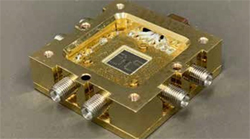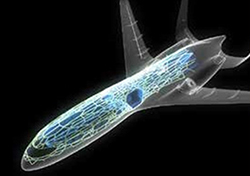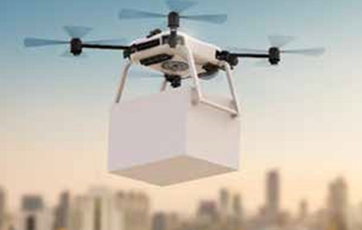PAQ Projects
 The Quantum Pack projects are an initiative of the Ile de France Region to encourage the adoption and development of quantum computing by economic players, industry and start-ups. Within this framework, young innovative companies receive funding from the region in order to explore the potential of quantum technologies for use cases proposed by industrial companies, which currently use digital simulation codes that are particularly demanding in terms of computing power. The Quantum Pack projects are an initiative of the Ile de France Region to encourage the adoption and development of quantum computing by economic players, industry and start-ups. Within this framework, young innovative companies receive funding from the region in order to explore the potential of quantum technologies for use cases proposed by industrial companies, which currently use digital simulation codes that are particularly demanding in terms of computing power.
Teratec, Genci and the Quantum Lab (LLQ) are helping to put these projects together and present them to the Region. Since the scheme was set up, 9 projects have been approved, enabling major industry players, leading academics and young innovative technology companies to join forces to provide innovative solutions to real-life problems. In 2022, Teratec was involved in setting up three projects: The AQUAEDP project led by Airbus, Onera and Pasqal, the QML-Cat project led by Naval Group, INRIA and Alice&Bob and the AQGeTAD project led by Thales and Quandela.
 Access the Press Release Access the Press Release 
3 Quantum Pack projects supported by Teratec

→ QML-Cat Project led by Naval Group
 The PAQ Ile de France scheme is a perfect opportunity to bring about a collaboration that a manufacturer/future user would have found difficult to initiate alone. In our case, the QML-Cat project started from a convergence of questions with Alice & Bob about the market segmentation of the different quantum computers - or, put more scientifically, is there an algorithmic application that makes one type of qubit more interesting than another? Each term in this question needs to be precisely defined and explored before we can answer it. Our point of view as systems engineers is to envisage, right now, for industrial programmes with a 20-year horizon, what the integration of QPUs would involve in terms of auxiliaries, space or functionality; and therefore to decide on the interchangeability of qubit technologies or, on the contrary, to bet on the specific advantages of each. The PAQ Ile de France scheme is a perfect opportunity to bring about a collaboration that a manufacturer/future user would have found difficult to initiate alone. In our case, the QML-Cat project started from a convergence of questions with Alice & Bob about the market segmentation of the different quantum computers - or, put more scientifically, is there an algorithmic application that makes one type of qubit more interesting than another? Each term in this question needs to be precisely defined and explored before we can answer it. Our point of view as systems engineers is to envisage, right now, for industrial programmes with a 20-year horizon, what the integration of QPUs would involve in terms of auxiliaries, space or functionality; and therefore to decide on the interchangeability of qubit technologies or, on the contrary, to bet on the specific advantages of each.
The QML-Cat study focuses precisely on the search for computation routines that would greatly benefit from the noise bias that makes Alice & Bob's cat qubit architecture particularly robust. This exercise, shared with INRIA, which is contributing its theoretical expertise in error mitigation and correction, runs counter to the growing tendency for any academic collaboration with industry to be based on the demonstration of a use case, at the risk of weakening its scientific interest.

→ The AQUAEDP project initiated by Airbus
 Fluid dynamics simulations are a fundamental tool for the aerodynamic design of aircraft. They enable the behaviour of the airflow around the aircraft and the aerodynamic forces acting on its surfaces to be determined. As part of the Teratec Quantum Computing Initiative (TQCI), via the PAQ IdF: AQUAEDP, the start-up Pasqal, the French aerospace research centre ONERA and the manufacturer Airbus are jointly exploring a different approach to tackling these fluid dynamics problems, in particular by using hybrid/quantum algorithms to reduce processing times. One of the main difficulties with aerodynamic problems is solving the associated partial differential equations (PDEs). The aim of this project is to take advantage of the developments made by Pasqal in the field of Quantum Neural Networks (QNN) to solve the problem described above. Airbus has launched in 2019, the exploration of quantum approaches to address aerospace challenges, and will continue by providing user cases and industrial problems. Airbus also wants to boost the quantum ecosystem: universities, research centres, start-ups and industry, and help train future engineers, developers and experts in quantum computing. Fluid dynamics simulations are a fundamental tool for the aerodynamic design of aircraft. They enable the behaviour of the airflow around the aircraft and the aerodynamic forces acting on its surfaces to be determined. As part of the Teratec Quantum Computing Initiative (TQCI), via the PAQ IdF: AQUAEDP, the start-up Pasqal, the French aerospace research centre ONERA and the manufacturer Airbus are jointly exploring a different approach to tackling these fluid dynamics problems, in particular by using hybrid/quantum algorithms to reduce processing times. One of the main difficulties with aerodynamic problems is solving the associated partial differential equations (PDEs). The aim of this project is to take advantage of the developments made by Pasqal in the field of Quantum Neural Networks (QNN) to solve the problem described above. Airbus has launched in 2019, the exploration of quantum approaches to address aerospace challenges, and will continue by providing user cases and industrial problems. Airbus also wants to boost the quantum ecosystem: universities, research centres, start-ups and industry, and help train future engineers, developers and experts in quantum computing.

→ The AQGeTAD project initiated by Thalès
 THALES is involved in 2 Pack Quantique IdF projects with start-ups QUANDELA and PASQAL. After the AQUAPS project (Avantage QUAntique pour la résolution de problèmes de Planning & Scheduling) with PASQAL in 2020, THALES has entered into a partnership with QUANDELA in 2022 on the AQGeTAD project (Quantum Advantage for the Management of UAV Air Traffic) of quantum computation applied to the optimisation of UAV trajectories. Conventional methods of calculating trajectories cannot be scaled up to cope with an exponential increase in the number of drones, with the constraints of short reaction times and high levels of safety. Frédéric Barbaresco points out that "the aim of this project is to benchmark the ability of QUANDELA quantum computers to optimise UAV trajectories while incorporating geometric constraints linked to their flight mechanics, no-fly zones, minimising their power consumption to increase their autonomy and complying with anti-collision constraints between UAVs". Thus, this study will contribute to establishing the technical specifications for scaling up future trajectory optimisation algorithms based on quantum computers, by validating new calculation concepts and studying their constraints for integration into the innovative UAV traffic management solutions developed by THALES. The methods used will aim to exploit the NISQ architectures available via QUANDELA's cloud offering since November 2022. THALES is involved in 2 Pack Quantique IdF projects with start-ups QUANDELA and PASQAL. After the AQUAPS project (Avantage QUAntique pour la résolution de problèmes de Planning & Scheduling) with PASQAL in 2020, THALES has entered into a partnership with QUANDELA in 2022 on the AQGeTAD project (Quantum Advantage for the Management of UAV Air Traffic) of quantum computation applied to the optimisation of UAV trajectories. Conventional methods of calculating trajectories cannot be scaled up to cope with an exponential increase in the number of drones, with the constraints of short reaction times and high levels of safety. Frédéric Barbaresco points out that "the aim of this project is to benchmark the ability of QUANDELA quantum computers to optimise UAV trajectories while incorporating geometric constraints linked to their flight mechanics, no-fly zones, minimising their power consumption to increase their autonomy and complying with anti-collision constraints between UAVs". Thus, this study will contribute to establishing the technical specifications for scaling up future trajectory optimisation algorithms based on quantum computers, by validating new calculation concepts and studying their constraints for integration into the innovative UAV traffic management solutions developed by THALES. The methods used will aim to exploit the NISQ architectures available via QUANDELA's cloud offering since November 2022.
Contact :
Emmanuelle Vergnaud
Operations Manager
emmanuelle.vergnaud@teratec.fr
|
|


